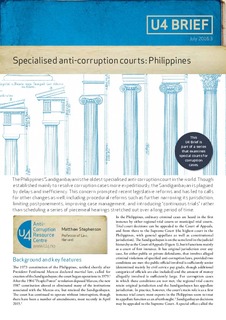| dc.contributor.author | Stephenson, Matthew | |
| dc.date.accessioned | 2018-01-04T08:21:00Z | |
| dc.date.available | 2018-01-04T08:21:00Z | |
| dc.date.issued | 2016-07-01 | |
| dc.identifier | oai:www.cmi.no:5884 | |
| dc.identifier.citation | Bergen: Chr. Michelsen Institute (U4 Brief 2016:3) 4 p | |
| dc.identifier.uri | http://hdl.handle.net/11250/2475163 | |
| dc.description.abstract | The Philippines' Sandiganbayan is the oldest specialised anti-corruption court in the world. Though established mainly to resolve corruption cases more expeditiously, the Sandiganbayan is plagued by delays and inefficiency. This concern prompted recent legislative reforms and has led to calls for other changes as well, including procedural reforms such as further narrowing its jurisdiction, limiting postponements, improving case management, and introducing "continuous trials" rather than scheduling a series of piecemeal hearings stretched out over a long period of time.
This brief is part of a series of case studies on special anti-corruption courts. The case studies discuss the courts' design and whether they have lived up to the expectations that led to their establishment. We draw lessons for their particular country context, but also specialisation of courts more generally.
These case studies will be complemented by a forthcoming issue paper discussing and comparing specialised anti-corruption courts around the world. | |
| dc.language.iso | eng | |
| dc.relation | U4 Brief | |
| dc.relation | 2016:3 | |
| dc.relation.ispartof | U4 Brief | |
| dc.relation.ispartofseries | U4 Brief 2016:3 | |
| dc.relation.uri | https://www.cmi.no/publications/5884-specialised-anti-corruption-courts-philippines | |
| dc.subject | Anti-Corruption Courts | |
| dc.subject | Special Criminal Court | |
| dc.subject | Specialised Anti-Corruption Bodies | |
| dc.subject | Justice | |
| dc.subject | Philippines | |
| dc.title | Specialised anti-corruption courts: Philippines | |
| dc.type | Report | |
